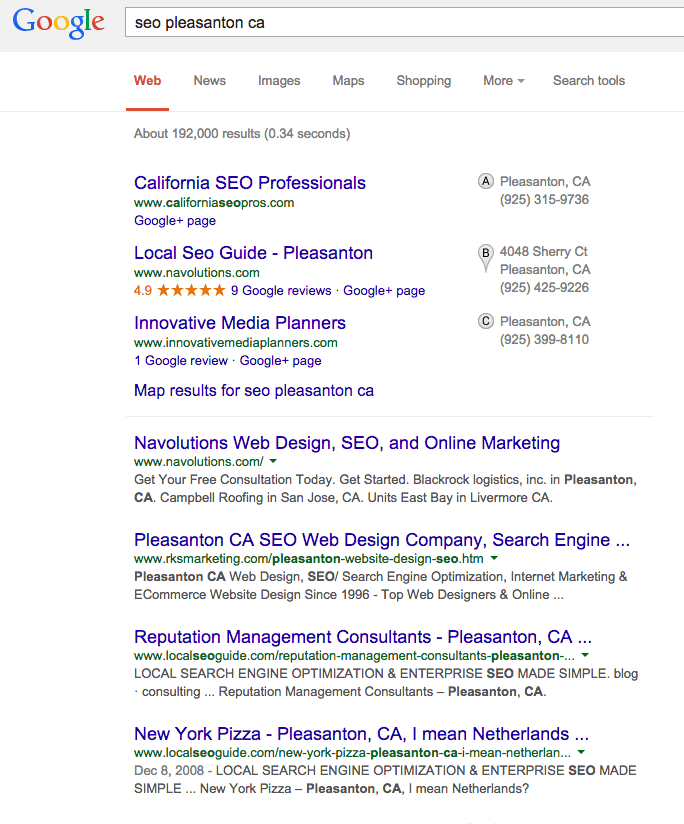Many large,
multi-location brands found that their traffic dropped after Google
released its Pigeon algorithm. Columnist Andrew Shotland discusses why.
At the Deconstructing Pigeon Panel at SMX, David Mihm, Adam Dorfman and I shared a lot of data
about the algorithm and how it had affected the local search engine
results pages (SERPs). One thing we didn’t really discuss was why big
multi-location brands may have been dinged.Over the past few months, we have received reports that some big brands have lost 5-10% of their organic traffic post-Pigeon.
As we discussed during the panel, Google had told Search Engine Land that Pigeon focused on the following :
- Increased importance of “Web ranking signals” (aka “backlinks”)
- Increased focus on Location
- Increased emphasis on Knowledge Graph results
But perhaps the real insight discussed by the distinguished panelists was that Google had perhaps overdone it on its “brand” algorithm and it now was incorrectly interpreting a lot of queries as “brand” queries which was leading to a lot of spam.
For example, if you search [miami movers] you now get this spamtastic result (exact match domains, fake virtual addresses, etc.):

We think this is because Google is interpreting the query as a brand query. So if your brand/domain is “miamimovermoving.com” (rolls right off the tongue doesn’t it?), you are more likely to show up #1 in the pack results, effectively pushing legitimate brands down and/or out.
If we combine this “Brand” over-weighting with the “Location” factor, this may start to explain what’s going on.
The Location factor appears to have made “implicit” local queries display local results in narrower radii than previously. So if you search [hardware stores] and are located in Portland, instead of getting a Portland-wide set of results, you now are more likely to get a set of results that are only within 10-20 miles of your actual location.
Basically, Google is treating desktop queries similarly to mobile queries.
As David said so eloquently in his post on the 2014 Local Search Ranking Factors, “The user is the new centroid.” (TL;DR results of the survey here.)
So, why would this hurt big multi-location brands? A theory:
- The over-weighting of “Brand” means that the following types of businesses may be getting more real estate in the pack results:
- Spammers with exact match domains
- Local businesses that are more likely to have the keywords in their business names (e.g., [Joe's Unusual Las Vegas Escorts in Las Vegas Nevada, LLC])
- The narrowing radii of the implicit local queries (which are likely the majority of queries) means that businesses that are not relatively close to the searcher are less likely to show up. While it’s not the case for all big chains, at least where I live, most of the big chain stores are located in the darkness on the edge of town. So perhaps they are victims of the cheap rent district.
So if this is the case, what can these big brands do about it? Some things to test:
- Use business descriptors in your Google My Business Page titles. For example, [Home Depot - Pleasanton]. This might give the location a bit more of a boost for local queries.
- While I would never suggest rebranding to [Home Depot Hardware Store] just to game a new algorithm, particularly one as flighty and temperamental as Pigeon, you may want to test tweaking the meta information and text content on your location pages to focus further on your main target keywords.
- Build links (carefully!) to your target store pages to make sure they are the strongest organically for your target queries. For example, Home Depot does not rank in the local results for [Hardware Stores] in Pleasanton, CA. Its top non-local pack organic result is a non-local category page. Ideally, it would be the top non-local pack organic result.
Chances are if they beefed up the “web ranking signals” for their Pleasanton location page, it would jump back in the pack. Post-Pigeon, we have seen a lot of this kind of thing.
Here’s an example: My site currently ranks #2 in the local pack for [seo pleasanton ca] against some specious hidden-address competitors:

But if I go into my Google My Business page and change the website link (which currently links to the “New York Pizza” URL that ranks #4 in the non-local organic section) to my site’s higher ranking homepage, in a minute or two, you can see that the pack results get forced upward:

What I think is happening is that the increased authority of the linked URL from my Google My Business page now increases the “web ranking signals” for the entire pack. Interesting that we all kind of help each other improve visibility, no?
Now for the real fun part:
What do you think would happen if I changed the link from my Google My Business page to www.navolutions.com, the #1 organic result (Hi Joe!)?:


Holy Web ranking signals, Batman! We just popped the local pack right to the top!
Now, I am not suggesting that Home Depot start hijacking domains, but this is exactly the type of spam tactic we are seeing pollute the local SERPs.
Even though it was not enough to put Local SEO Guide in the top spot, it’s pretty clear that increasing the authority of the URL linked from your Google My Business page should do good things for your local rankings.
Ok, I’ve said enough. Talk amongst yourselves…
Source Of: http://searchengineland.com/googles-pigeon-crap-big-local-brands-206468



0 comments:
Post a Comment